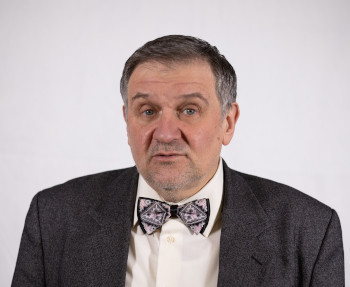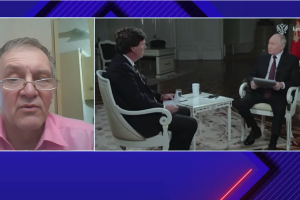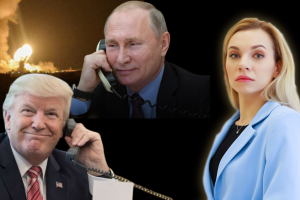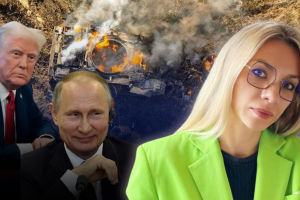Two victories in the global South: Oleksiy Haran on the BRICS Summit and Latin America
The fact that Putin will not go to the BRICS summit, as well as the fact that the EU-Community of Latin American and Caribbean States summit ended on an optimistic note and its participants condemned the war against Ukraine, supported the grain initiative and reaffirmed their positions, Oleksiy Haran, professor of political science at the National University of Kyiv-Mohyla Academy, scientific director of the Ilko Kucheriv Democratic Initiatives Foundation, considers the conference to be Ukraine’s victory in the Global South. This was discussed in his interview for Espresso TV.
The government of the Republic of South Africa has officially applied to the court for an arrest warrant for Russian leader Vladimir Putin if he arrives in the country. Despite previous efforts by South African President Cyril Ramaphosa to shield Putin from responsibility for his war crimes, “the prosecutor’s commitment to justice and the rule of law has been fully vindicated,” the main opposition party, the Democratic Alliance, said in a statement. So, when asked whether it is possible to say that South African justice is different from Russian justice and that South African President Cyril Ramaphosa decided to show this to Vladimir Putin, Alexey Garan answered: “We knew that the justice system in South Africa is different from the Russian one and that the South African judicial system is working, despite the fact that one party has been in power there since 1994. But this is not the first example of court decisions being made contrary to government decisions. For example, the South African government signed a contract with Russia to build a nuclear reactor in South Africa, but civil society went to court because there were violations of the procedure, and the court cancelled this billion-dollar contract. So this is not the first such decision.”
Oleksiy Haran noted that not only did the judicial system play an important role in this case, but other factors also came into play. First, it was the pressure of the opposition. “However, despite the fact that the opposition party Democratic Alliance takes a pro-Ukrainian position and puts pressure on the government, it does not have a majority in parliament, so it will not be able to win the upcoming elections,” the political analyst said.
Secondly, South Africa has a fairly strong civil society, which has quite powerful pro-Ukrainian views, unlike the government, the scholar said. There is free discussion in the press and in think tanks. Thirdly, according to Oleksiy Haran, Ramaphosa has realised that it will not be very profitable for him. “If we look at South Africa’s trade and economic ties, the share of Russia in South Africa is small. For China, yes, but not for Russia. And the bulk of trade and economic relations are with the West. And the West, as we know, has been putting pressure on South Africa,” he stressed.
Oleksiy Haran considers the fact that Putin will not attend the BRICS summit a victory for Ukraine: “Do you remember how we reacted to the visit of African leaders led by Ramaphosa to Ukraine? We had few expectations, and on the contrary, we said that it could play in Russia’s favour. Ramaphosa twice called the war a war, which was unexpected for South Africa’s position. Then he returned home, and his statement no longer mentioned war, but rather conflict. But we can see the result. A combination of various factors and circumstances led to this very important symbolic victory, which shows that we need to work despite all the problems.”
Of course, in addition to victories, there are problems, he noted and explained: “I travelled to 10 countries of the Global South, I thought I understood the internal situation of these countries well, and I used to think that I just needed to convey the truthful information there, and people would change their position. But the problem is that anti-Westernism, which is a consequence of colonialism, is very strong in the minds of people in these societies. It is part of their mentality and political culture. If we look at Latin America, anti-Americanism is very strong there, and so the concept of multipolarity, which Russia and China are advocating, albeit in their own interests, is a natural concept for them. They are constantly emphasising the neutrality of their countries, and so it will take a lot of hard work to change this position.”
Oleksiy Haran considers the final text of the Declaration of the EU-Community of Latin American and Caribbean States Summit, in particular, paragraph 15, to be the second victory in the Global South. After all, on the eve of this summit, there was a real diplomatic struggle to write down a tough resolution that Russia is an aggressor and guilty of crimes against Ukraine, as EU leaders insisted.
“Some Latin American countries support this,” explains the scholar, “such as Chile or Argentina, which voted at the UN to expel Russia from the Human Rights Committee. But countries such as Nicaragua, Venezuela, Cuba, and Bolivia remain sympathetic to Russia. Other countries vote in favour of Ukraine’s territorial integrity at the UN. The Latin American continent is in solidarity on this issue. That’s why it was not possible to do what the European Union wanted, to mention Russia as the aggressor and culprit.”
Russian propaganda immediately pointed out that the EU and Latin America had failed to reach an agreement at the summit and had quarreled over Ukraine. Some Ukrainian and Western media also picked up on this thesis. In fact, this is a misinterpretation, says Oleksiy Haran: “If you look at the original Declaration, paragraph 15, which is entirely devoted to Ukraine, it clearly states that this war waged against Ukraine has destroyed the global economy and led to higher prices. It also states that all countries fully support the grain initiative and reaffirm their positions during the UN vote. This refers to the resolution at the beginning of the aggression in March 2022 and the most recent resolution adopted in February 2023 on the territorial integrity of Ukraine and the withdrawal of Russian troops. In addition, this paragraph states that a just peace must be established on the basis of the principle of the sovereignty of Ukraine’s territorial integrity. And although Russia is not directly mentioned there, if it says that the war against Ukraine is condemned, we know who started this war.”
Oleksiy Haran is convinced that paragraph 15 of the Summit Declaration fully supports Ukraine’s position, so he considers this statement to be another victory for Ukraine.
Translation: Reanimation Package of Reforms









